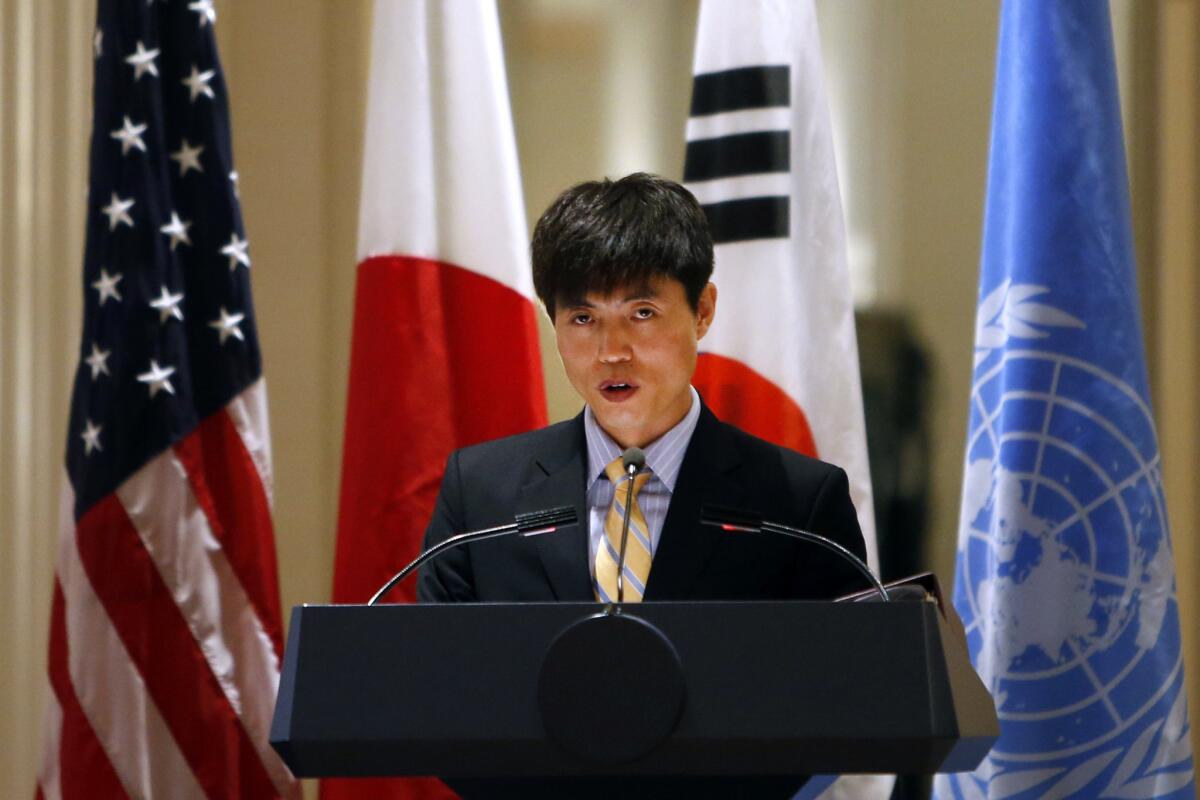North Korea defector who fled prison camp changes story

- Share via
Reporting from the United Nations — A prominent North Korean defector who fled a prison camp and became the face of international efforts to hold the country accountable for widespread human rights abuses has changed important parts of his life story.
Author Blaine Harden said in a statement on his website that he has pressed Shin Dong-Hyuk to “explain why he had misled me” during interviews for Harden’s book on Shin, “Escape From Camp 14.”
North Korea tried to discredit Shin late last year as it fought a U.N. General Assembly resolution that backed the findings of a groundbreaking U.N. commission of inquiry into Pyongyang’s human rights abuses.
Human rights groups say the U.N. inquiry was based on interviews with scores of North Korean defectors. “Its findings are still valid,” said Brad Adams, Asia director for Human Rights Watch.
Shin was traveling and could not be reached for comment. He was expected to arrive in Seoul from the U.S. on Monday afternoon, said Greg Scarlatoiu, executive director of the Washington-based Committee for Human Rights in North Korea.
“Every one of us have stories, or things we’d like to hide,” Shin said in an apology for the inaccuracies in recounting his past in his latest Facebook post, giving few details. He said he may or may not be able to continue his work of trying to eliminate North Korea’s political prison camps but urged others to keep fighting. “These will be my final words and this will likely be my final post.”
Shin’s story originally drew widespread attention because he said he had lived in a high-security political prison camp in North Korea from his birth until his escape through an electrified fence. He was said to be the only person who had escaped from such a camp.
Harden’s statement said he passed along Shin’s new information to the Washington Post, his former employer. Its report over the weekend said Shin now says he was transferred around the age of 6 to a lighter-security prison camp with his mother and brother. It was there, not the harsher camp, where he informed authorities about an escape attempt by his mother and brother. For that, they were executed. He now says he was later transferred back to the harsher camp.
“The fundamental building blocks of his story have remained the same, although I am fully aware of the differences between” the two camps, Scarlatoiu said Sunday. “Still, born and raised in a camp, he was subjected to forced labor, induced malnutrition and torture. He informed on his mother and brother, who were executed. He escaped from the camp, and lived to tell his story. None of that has changed.”
North Korea’s government denies the existence of the harsh political prison camps, and human rights groups and others rely on both information from defectors and satellite images for information. The government did not allow the U.N. commission of inquiry to visit the country for its work.
The commission’s report, released early last year, detailed abuses including mass starvation and forced abortions, and it recommended that North Korea’s human rights situation be referred to the International Criminal Court. The commission also sent a letter to young leader Kim Jong Un warning him that he could be held accountable.
That alarmed North Korean authorities, and its diplomats circulated a DVD called “Lie and Truth: Who is Shin Dong-Hyuk?” in an attempt to discredit him by using video of his father speaking out against him. But Shin said the DVD merely proved that his father was still alive.
More to Read
Sign up for Essential California
The most important California stories and recommendations in your inbox every morning.
You may occasionally receive promotional content from the Los Angeles Times.













